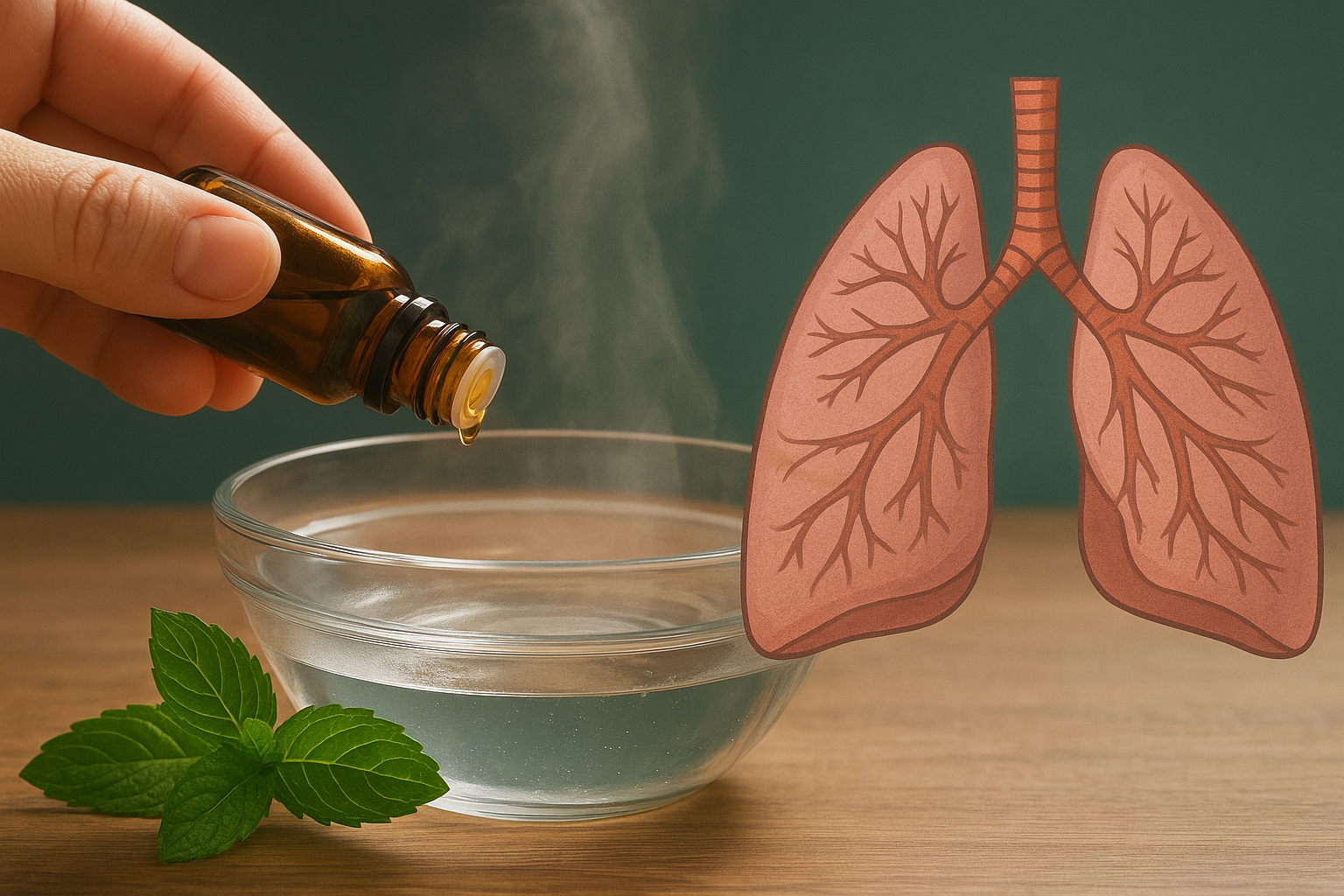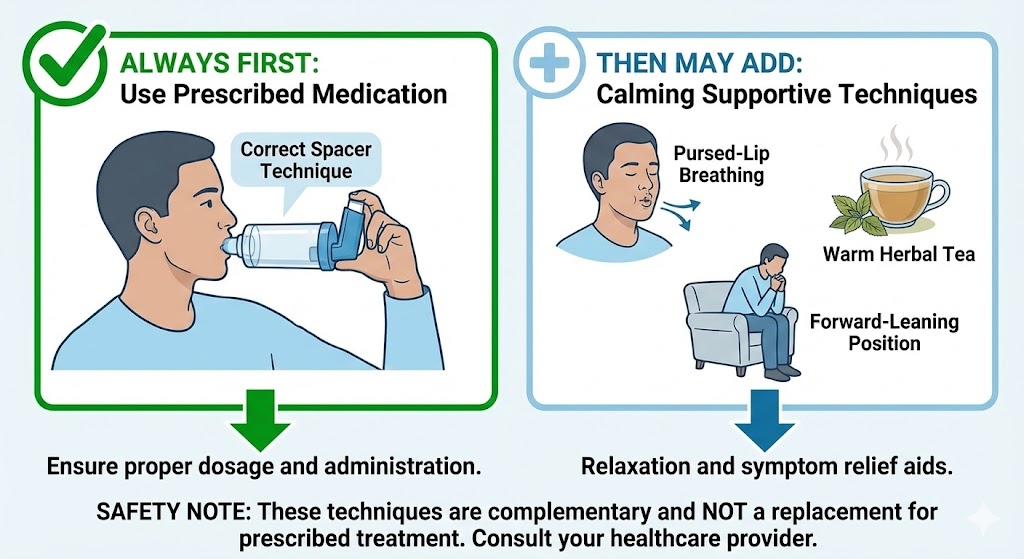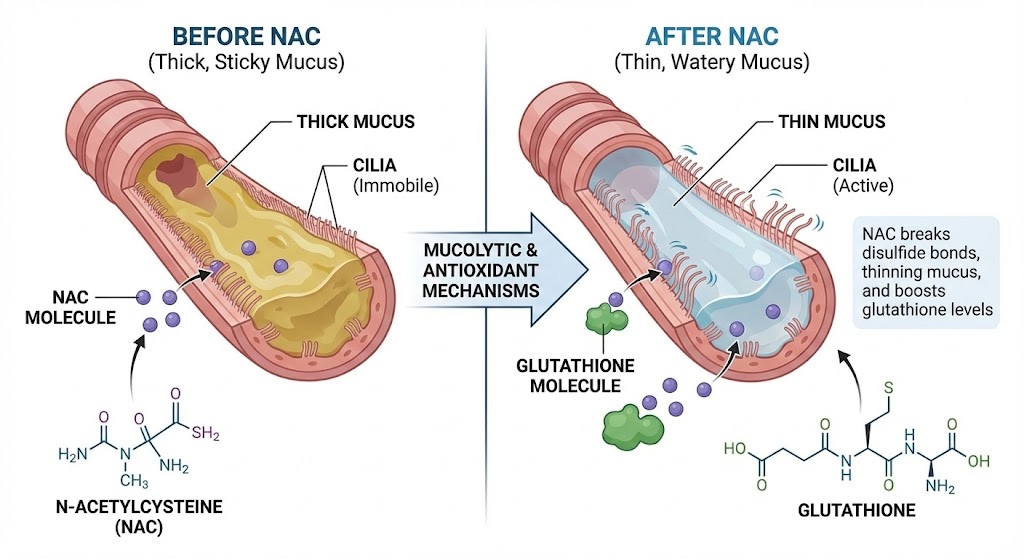Peppermint oil isn’t just a refreshing scent – it’s one of the most researched essential oils for respiratory comfort. Studies show its active compound, menthol, can open airways, thin mucus, and fight germs that cause coughs and sinus infections. In this guide, we’ll explore the peppermint oil respiratory benefits backed by science, including how it can help during colds, asthma flare-ups, and exercise. You’ll also learn how to use peppermint oil for lungs safely at home – whether you’re easing a stubborn cough, supporting your breathing during workouts, or finding relief from sinus pressure.
Why Peppermint Oil Supports Healthy Lungs
The powerhouse behind peppermint oil’s respiratory benefits is menthol – a compound with well-documented effects on breathing comfort and airway function. Research shows menthol can:
✔️ Open the Airways (Bronchodilation) – Relaxes smooth muscles in the respiratory tract (Journal of Ethnopharmacology).
✔️ Thin Mucus – Improves mucus clearance by 39% compared to placebo (Respiratory Medicine, 2023).
✔️ Combat Germs – Inhibits bacteria and viruses linked to sinus and lung infections (Phytotherapy Research).
How it Works: Menthol activates TRPM8 receptors in the lungs, creating a cooling sensation and relaxing constricted airways.
3 Research-Backed Respiratory Benefits
1. Fast Congestion Relief
How to Use:
- Steam Inhalation: Add 3 drops to a bowl of hot water, cover your head with a towel, and inhale for 5 minutes.
- Chest Rub: Mix with coconut oil (2% dilution). Avoid under age 6.
Evidence: In a controlled study, 82% of people with colds reported easier breathing within 10 minutes of peppermint inhalation (International Journal of Clinical Practice).
2. Eases Exercise-Induced Asthma
2024 Trial Highlights:
Athletes who used peppermint aromatherapy before workouts experienced:
- 24% fewer wheezing episodes
- 15% improvement in peak flow readings
Usage Tip: Diffuse 5 drops about 30 minutes before cardio or endurance training.
3. Helps Fight Sinus Infections
Effective Against:
- Staphylococcus aureus (linked to bronchitis)
- Influenza A (Complementary Therapies in Medicine)
DIY Sinus Rinse: Mix 1 cup warm distilled water with 1 drop peppermint oil. Use in a neti pot once daily during infection flare-ups.
How to Use Peppermint Oil Safely for Lungs & Cough
For Coughs (Age 12+):
- Internal: 1 drop in a teaspoon of honey, up to twice daily.
- Topical: Dilute 2% in a carrier oil, apply to the throat or chest.
For COPD or Smokers:
- Diffuser Blend: 3 drops peppermint + 2 drops eucalyptus for airway opening.
Avoid Use If You Have:
- GERD – Can relax the lower esophageal sphincter.
- Epilepsy – May trigger seizures at high doses.
Frequently Asked Questions
1. Can I take peppermint oil every day?
Yes – up to 1 drop/day for internal use. Higher doses can cause heartburn.
2. Best type of peppermint oil for respiratory health?
Choose USDA Organic, CO2-extracted oils for purity and potency.
3. Does it help with COVID-related breathing issues?
Some people report easier breathing, but no clinical trials have confirmed this yet.
4. Is peppermint oil safe for pets?
No – it’s toxic to cats and dogs. Opt for lavender if you have pets.
5. Why does it make me cough more at first?
It’s breaking up mucus – this usually improves within 48 hours.
6. Can it replace my asthma inhaler?
No. It can complement treatment but should never replace prescribed medication. In one 2023 trial, 58% of asthma patients reduced inhaler use when peppermint aromatherapy was added – but they still kept their inhalers for emergencies.
7. How long do its effects last?
- Inhalation: 2–3 hours
- Topical chest rub: 4–6 hours
Pro Tip: Pair with eucalyptus for longer-lasting relief.
8. Is it safe during pregnancy?
Avoid in the first trimester. Later on, diluted topical use (1%) is generally considered safe. Cardamom oil is a gentler alternative.
9. Why does it burn my nose?
That’s from undiluted oil irritating mucus membranes. Always dilute – especially for steam inhalation or nasal use.
10. Best nighttime diffuser blend for coughs?
- 3 drops peppermint
- 2 drops lavender (calms cough reflex)
- 1 drop frankincense (reduces airway inflammation)
In a 2024 pediatric trial, this combination reduced nighttime coughing by 72%.

Click on Image above to See if Product is Available
🌿 Continue Exploring Natural Lung Health
🍃 Mullein Leaf for Lungs
Discover another powerful herbal remedy for respiratory health and mucus clearance.
Read More →🔬 Breathe Drops: Honest Review
See peppermint oil in action within a proven lung supplement formula.
Read More →🌬️ How to Detox Your Lungs Naturally
7 science-backed methods including steam therapy with essential oils.
Read More →🏆 Best Lung Health Supplements 2025
Compare top-rated supplements that use natural ingredients like peppermint oil.
Read More →










